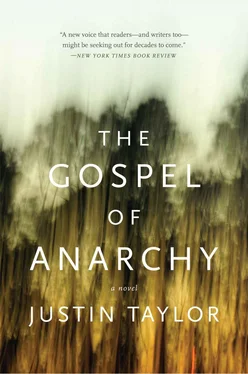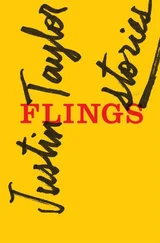“They won’t ask. It’ll be okay.”
“Thank you,” I said. “All glory be to your name.”
“Not my name, but the one who named us. Our souls are our names,” Parker said. “You already know this. Every moment of our living is us hearing God speak our names, and our listening to him speak is us knowing ourselves.”
The not-nurse stuck her head into the cubicle, the little not-quite room.
“Doin’ okay?” she said.
“Better than just okay,” I replied. She shrugged — what was it to her?
“Okay then,” she said. “I come back in another half hour and unhook you.”
She went away and I looked back to where Parker had been, knowing he would no longer be there, but hoping anyway, then sinking into disappointment, then berating myself for that disappointment, because I knew how he would have despised it. I should have been grateful he had come at all.
I was light-headed now. My thoughts were drifting; they floated easy over the past few months, which laid themselves out before me, like a landscape painting. Through Parker’s grace I had been given the boon of Sight, and as I lay back in my chair, I allowed my body’s eyes to shut, slowed my breathing down, so to let the eyes of my heart blink open, and my spirit dreamed expansively beyond its gilded cage of flesh. Even in this moment, I thought, I can hear God speaking my name! I saw scenes and visions of those whom I loved.
I saw Thomas in his adopted home, Seattle, holding a black laundry marker, writing the number of the free legal aid hotline upside down on his stomach, so that later, after he got arrested during a protest and had all his belongings taken, he’d be able to simply lift his shirt and know who to call.
I was seeing the future, I realized. I was seeing the shape of things to come.
Owl and Selah at the New Year’s Eve camp-out concert in Big Cypress, way down south, which that goofy band Phish was throwing. For all Owl’s talk about Asheville, old friends, and new prospects, everyone who knew them knew they would go the other way, farther down into the cul-de-sac of Florida, and drink mushroom tea with their fellow travelers and worship nonsense and noodly guitar. Somebody’s toddler running wild through the crowd, all the legs like a forest to him.
I saw Anchor at home in her dorm room — could this be the present now? — stretched out on her belly across her unmade twin bed. There was a Bob Marley poster on the wall on the roommate’s side. Anchor’s own wall was bare, her socked feet bobbing in the air as she composed a poem for her creative writing class.
Song
We stand apart and are beautiful
Even when most ugly. We are furious
With anything that hums, clanks — how
Many greasy gears have ground us down,
Axled dumb as the sun to the years?
We say better destroyed by
Than to become; better die
In opposition than live mastered.
We love to fertilize: each
Unto each and all, in time, the grasses.
The worst injustice is being named
For what we stand ever against
And standing ever against it, ever fall.
We are originals. The world has lost
Its way and you know what we mean.
You don’t prefer, indeed refuse
To hear first principles and origin
Myths. Neither the screaming
Nor the stifled screaming
Of your victims and constituents.
Nobody builds us monuments. We lose
No faith, no war, only blood and battles.
We prove Grace, and the limits of Grace.
Together alone is our true song ever sung.
We were old when the world was young.
I thought that was a pretty good poem — but of course it wasn’t really Anchor’s. It was my own creation. I had made it up from the strength of my vision of her. My love for the truth and for my friends was so strong that even as she pulled away from us I could see her more clearly in my mind, as though she sat right across the room from me, as if she stood as close to me as Parker had only moments ago.
But I was confused by my poem. I didn’t understand what I had meant by “most ugly.” By “the limits of Grace.” Ugliness, after all, was impossible in a world where all was permitted and beautiful, constituted by the fact of its inherent Grace, which was — would be — unending. But perhaps I had simply meant something about the way in which Grace manifests, or is bestowed. It was worth thinking about. I was teaching myself, it seemed, or wasn’t it possible that Parker was speaking through me? That the eruption of these verses was a reverberation, an aftereffect, an echo, of the gift of his having come? But what if I were to forget the poem? I needed to preserve it! If I were to call out for a pen and paper, would the plasma people bring me these things? Could I commit my poem to memory? I would finally have something of my own to share at the open mic! But then I thought how Desire is a strange attractor. Your longing warps the arc of the world’s emergent truth and I saw that Parker had come to show me something, if I would only have ears to hear him and eyes to see. Strange attractor, yes. My desire as right action in the world. I would not write the poem down, but instead concentrate all my spirit on the vision in my mind of Anchor writing it. By the sheer force of my longing, she would compose it herself.
The knife edge of heat dulled even as the greens of the trees did — we had cooling, and then cool, and then cold rain, and didn’t break in anymore to the hotel pool — and the days grew short, and shadows lengthened. November came and we switched the clocks back. The snowbird-punks began to appear. These were a strange breed, reverse jet-setters, people who’d been living outside or in raw squats all around the North-east and were now looking to scout new homes in warmer climates, spend their winters bumming around the snowless South. I can’t say who came and went when, exactly, but I can picture all of their upturned faces — smudged with dirt, or else fresh after a grateful turn in our shower — while Katy and I sermonized. I remember dumpster runs they helped us with, or things we talked about sitting around the living room: how it would be after the state fell and we lived in the eternal revolution and walked with God, or nights they spent in our six or four or two or ten arms. I remember only fragments of their stories, or else fragments were all I ever knew.
Dennis was a pro-bicycle, anti-car activist from Arizona. He taught us how to fix and replace our own brakes and gears.
Heidi, a German girl touring the States on her gap year. An astonishing blonde, for whom Aaron fell hard. She took him to hop his first train and they made it as far as Louisiana, where they got arrested for skinny-dipping in a private pool, trying to soothe nasty doses of poison ivy they’d picked up in a hobo jungle in Alabama, waiting for a train. They explained about the poison ivy to the cop who busted them (leaving out the part about the train) but he misheard what they said and by the time they went before the judge for trespassing two days later it was generally known about the precinct and the courthouse that both the hobos had H IV. The backwater judge threw their charges out on the condition that they get straight out of town — he didn’t want that kind of shit in his district, not even locked up. Was this not an example of God’s abundant grace? Aaron came home; I don’t know where the girl went next.
Jackie Jazz — so many of them named themselves! — wore a porkpie hat that was no less dashing for how bad it smelled, and traveled with his best friend, a mongrel dog (about which, ditto).
Byron was a black secessionist. He believed that if the South had won the Civil War, the institution of slavery would have inevitably collapsed in short order, and that this sea change would have spread to the white working classes as well, triggering a socialistic awakening throughout the whole region. Without the humiliation of defeat and the economic colonialism of the Northern carpetbagging industrialists, the whole modern history of Southern race relations would have been entirely different, trending toward a universal equality that would have by now been long since achieved. No miscegenation laws, no lynchings, no separate but equal, no Jim Crow. Plus, a defeated and weakened North would never have managed to complete their seizure of the American continent, or even to hold on to what they had. Byron sported a Confederate flag on his guitar case and held in his head an alternate map of the country, where the Southwest was part of Mexico, the Northwest was a sovereign unified Indian nation, California was the Bear Flag Republic, the Northeast was something like Eastern Europe, and we all lived in the Socialist Confederacy, which thrived. Moreover, in this formulation, there would have been no American Empire to replace the already-ailing British one, and the entire Age of Empires would have hastened all the more rapidly toward its end. So really, he said, the whole world would have been different, and better, if only the South had triumphed. Was this really so wild a notion? We begged him to start over from the beginning; take us through it again.
Читать дальше












